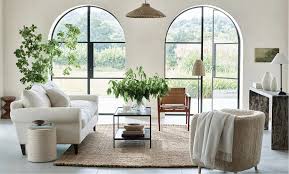In the evolving landscape of interior design, modern organic decor has emerged as a beloved trend for those looking to infuse their living spaces with warmth, comfort, and a connection to the natural world. This design philosophy blends clean, contemporary lines with organic forms and natural materials, creating serene, inviting environments. Here’s an insightful guide on how to integrate modern organic decor into your home to create spaces that are not only stylish but also inherently cozy and welcoming.
Understanding Modern Organic Decor
Modern organic decor focuses on simplicity and the subtle harmony between modern minimalism and the raw textures and forms of nature. This style is characterized by a neutral color palette, uncluttered spaces, and the use of sustainable materials like wood, stone, bamboo, and linen. The goal is to craft a tranquil retreat from the bustling world outside, emphasizing comfort and sustainability without sacrificing elegance.
Key Elements of Modern Organic Decor
1. Natural Materials
At the heart of modern organic decor are natural materials, which bring authenticity and texture to interiors. Incorporate elements such as hardwood floors, stone countertops, and furnishings in natural fabrics like cotton, wool, or silk. These materials are not only eco-friendly but also age beautifully, adding character and warmth to any space.
2. Neutral Color Palettes
Choose neutral color palettes that echo the natural world. Shades of beige, gray, white, and earth tones are ideal for creating a calm and relaxing atmosphere. These colors can act as a canvas, allowing textures and materials to stand out. For instance, a soft beige wool rug or creamy linen drapes can add layers of warmth and comfort to a room.
3. Organic Shapes and Forms
Opt for furniture and accessories with organic shapes—curved, flowing, and free of sharp angles. These forms mimic the irregularity found in nature, providing a soft, approachable look that complements the clean lines of modern design. Items, like rounded wooden chairs, oval tables, or curvaceous vases, can effectively add this natural softness to your decor.
4. Minimalistic Approach
Modern organic decor thrives on the principle of “less is more.” A minimalist approach helps to reduce clutter, allowing the quality and texture of the materials to shine through. Choose a few well-crafted pieces over a multitude of ornate items. This not only enhances the overall aesthetic but also creates a more relaxing environment.
5. Incorporating Greenery
Plants are a quintessential element of modern organic decor, adding vitality and a touch of color to neutral spaces. They also improve air quality and connect indoor environments to the natural world. Consider a mix of large potted plants, like fiddle leaf figs, and smaller green touches, such as succulents or herbs in the kitchen.
6. Light and Airy Spaces
Allow plenty of natural light to permeate the space to enhance the organic feel. Use sheer, light fabrics for window treatments that provide privacy without sacrificing brightness. If natural light is limited, choose lighting fixtures that mimic natural light, with soft, diffused lamps or strategically placed spotlights that highlight organic materials and plants.
Conclusion
Modern organic decor is more than just a style; it’s a reflection of a lifestyle that values sustainability, simplicity, and a connection to nature. By integrating natural materials, embracing a neutral palette, and focusing on a minimalist design ethos, you can transform your home into a warm, inviting sanctuary that feels both modern and timeless. Whether renovating an entire house or refreshing a single room, these principles can guide you in creating a space that feels both grounded and elegant.

